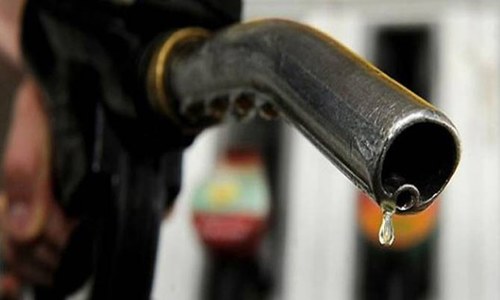ISLAMABAD: Amid declining trend on international markets, the government on Saturday reduced petroleum prices by Rs5-7 per litre for March.
A notification issued by the Ministry of Finance said the prices of petrol and diesel have been cut by Rs5 each per litre to Rs111.60 and Rs122.26 respectively.
The Oil and Gas Regulatory Authority (Ogra) had calculated about Rs15 per litre reduction in the price of high-speed diesel (HSD) and petrol.
Three different proposals were floated for price cuts as the Dubai Crude rate came down from $62 per barrel on Jan 31 to $50 a barrel on Friday, down 19.35 per cent.
On the other hand, the benchmark International Brent price had fallen from $60 a barrel to $51 a barrel, down 18.33pc.
However, the finance ministry and Federal Board of Revenue (FBR) were trying their best to pass on about half of the price reduction calculated by Ogra to consumers and retain the remaining amount as windfall by increasing tax rates.
Diesel and petrol are the most-consumed petroleum fuels in the country with an average consumption of around 700,000 and 600,000 tonnes per month respectively.
However, consumption during the month of March is lowest mainly due to seasonal factors as the use of fuel reduces significantly on account of negligible requirements for either heating or cooling systems.
Similarly, consumption is also likely to remain muted due to educational examinations and coronavirus threats in the current scenario.
Meanwhile, an oil marketing company official said the diesel consumption picks up heavily after the second half of April to end of June due to wheat harvesting and threshing season. In addition, use of generators also increases due to power shortfall and local movement rises manifold following holidays in educational sector.
The notification by the finance ministry also said that per litre prices of kerosene oil have also been reduced by Rs7 to Rs92.45 whereas the Light diesel oil (LDO) have also been reduced Rs7 per litre to Rs77.51.
Both — kerosene and LDO — are dying fuels and their average monthly consumption in the country is less than 10,000 tonnes.
The LDO is mainly used in certain kinds of old model engines operating mills and some tube wells in rural areas, whereas, the widespread availability of LPG has almost replaced kerosene oil in burners.
The reduction in fuel prices will also benefit the aviation industry as well as the armed forces because the rates of various jet fuels too have declined for the month of March.
Over the last few months, the government had increased petroleum levy rates to partially recoup a major revenue shortfall faced by the FBR. The levy remains in the federal kitty unlike general sales tax (GST) that goes to the divisible pool of taxes and thus about 57pc cent share is grabbed by the provinces.
The government already increased the GST on all petroleum products to standard rate of 17pc across the board to generate additional revenues.
Until January last year, the government was charging 0.5pc GST on LDO, 2pc on kerosene, 8pc on petrol and 13pc on HSD.
Besides the 17pc GST, the government had more than doubled the rate of petroleum levy on HSD in recent months to Rs18 per litre instead of Rs8 per litre. The levy on petrol had also been increased by 50pc to Rs15 per litre instead of Rs10 per litre. The petroleum levy on kerosene oil and LDO remained unchanged at Rs6 and Rs3 per litre, respectively.
Published in Dawn, March 1st, 2020















































